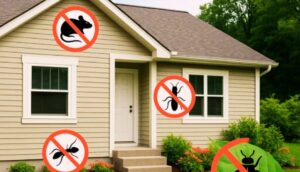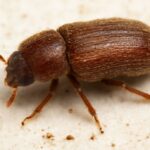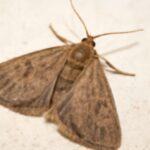10 Ways to Get Rid of Lizards Indoors

I am sure that at some point we have all had to deal with lizards in our homes however, for some, it may have been more often than others. Why are lizards attracted to our indoor living space, and what steps can be taken to deter them or to bring control for a lizard-free zone?
The presence of lizards in our homes indicates they are searching for a food source, be it spiders, roaches, or ants, and because of this, their presence will help reduce these pests in our homes. Still, despite this advantage, some homeowners would rather not have them around if this is your view then here is what to do to bring control.
As an Amazon Associate I earn from qualifying purchases
1. Lizards are Attracted to Food and Water Sources
Lizards are not only attracted to insects as a food source but also moisture, there may be a lecky indoor pipe or faucet that lizards are drawn to so make sure there are no leaky pipes or faucets. Then there is the issue of water that may be left on your kitchen countertop or other areas where foods are consumed ensure these places are always free of water. Bathtubs, kitchen, and bathroom sinks should also be kept dry at all times when not in use.
Standing water in the saucer of potted plants should be removed, condensation on a water cooler, and water in pet bowls are a good water source for lizards. The goal is to cut off all indoor water sources to discourage the presence of lizards.
Use adehumidifier like the hOmeLabs Energy Star Dehumidifier to cut down indoor moisture. This not only discourages lizards but also keeps mold and bugs away.
2. Lizards are Attracted to Heat
Because lizards are cold-blooded they will regulate their body temperature by moving between warm and cool spaces. During the cooler months, lizards will move toward your home because of the dryer vents or heating system.
Block access with a door sweep such as the Holikme Twin Draft Stopper — a simple fix to stop warm air (and lizards) from sneaking inside.
3. Lizards are Attached to Lights
Outside lighting is used for security purposes at night but these lights will attract spiders, roaches, and other insects that lizards eat, the solution is not to shut off your lights at night but to change your bright light to using LED Lights. These lights will discourage fewer bugs that are attracted by heat.
4. Seal All Entry Points
For lizards to enter your home they must find an entry point, because of this make sure that all entry points outdoors are sealed off. Look for cracks or openings around your window and seal with caulk, repair torn window, and door screens, and look for cracks or open spaces around your door and seal or repair. Lizards can also get indoors based on their size which will allow them to fit underneath small door spaces, make sure that your door has a door swept and that the door swept is in good repair. If your wall has cracks these cracks should be sealed with urethane or silicone. There are openings where water and electrical pipes enter the home, many times the space around these pipes is large enough to allow insect pests including lizards to enter. Seal around these openings with caulk or spray foam.
A popular option is Great Stuff Pestblock Foam Sealant, designed specifically to block out bugs, rodents, and yes, lizards.
5. Make Sure that indoor Garbage is Properly Sealed
Indoor trash containers that are used to place kitchen scraps should be properly sealed because uncovered containers will attract roaches and ants that will attract lizards that are in search of insects as a food source. Ensure that your indoor trash can has a tightly sealed lid to discourage ants and roaches. Exposed kitchen scraps will encourage the presence of mice and rats also.
Upgrade to a tight-seal trash can like the simplehuman Rectangular Step Trash Can — odor-free, hands-free, and pest-resistant.
6. Don’t Allow Foods to Remain Uncovered
Allowing foods to remain uncovered, leaving pots, and pans after cooking unwashed, failure to wipe down stove tops, and kitchen countertops, allowing dirty unwashed dishes to remain, and not cleaning up food particles will attract ants and roaches that are a favorite food source of lizards. Clean all cookware, and dishes and wipe down stove tops and kitchen countertops to discourage the presence of lizards. Unsansitized indoor conditions will encourage rats and mice also.
For convenience, keep Clorox Disinfecting Wipes handy to quickly sanitize counters and eliminate food scents that lure in bugs and lizards.
7. Eggshells
Lizards hate the scent of eggs, Once you are done with the eggs don’t throw away the eggshells, crush the eggshells, and place the shells in areas where lizards are seen. This will keep them away.
8. Garlic and Onion Mix
Lizards hate the aroma of garlic and onions, simply slice garlic and onions and place them in areas where you see lizards hanging out, the scent of onion and garlic will keep lizards at bay.
For a cleaner method, try Peppermint Essential Oil Spray — a natural repellent that works against lizards, ants, and spiders.
9. Vinegar Spray Mix
Mix equal parts of vinegar and water, and place in a 32 oz spray bottle, spraying this mixture around your home will keep lizards away.
10. Lizard Repellents
Different brands of lizard repellents can be purchased from your garden center and plant nursery, before the application of repellents read and follow the manufacturer’s directions for the best results.
A top-rated option is the Exterminators Choice Lizard Defense Spray — non-toxic, safe for kids and pets, and highly effective indoors and outdoors.
Bonus: Electronic Repellents
Prefer a hands-free solution?
Check out the BRISON Ultrasonic Pest Repeller. It uses ultrasonic waves to deter lizards, mice, and insects without chemicals.
Call in the Professionals
If you don’t want to do the job yourself then there is always the choice to call in a professional pest control company that will do the job for you.
10 Frequently Asked Questions (FAQs)
FAQ 1: Why do lizards come into my house in the first place?
Lizards usually enter homes in search of food (like insects), water, and warmth. If you’ve got flies, ants, or other bugs hanging around, lizards see that as an open buffet! They may also sneak in through small cracks or open windows, especially at night when lights attract their prey.
FAQ 2: Are house lizards harmful or dangerous?
Not really. Most house lizards are harmless and even helpful since they eat bugs. However, they can be creepy to some people and may leave behind droppings. So while they won’t bite or spread major diseases, it’s understandable if you’d rather not share your living space with them.
FAQ 3: What’s a natural way to repel lizards?
A great natural trick is using pepper spray or garlic water near windows and doorways. Lizards dislike strong smells, so citrus peels, onion slices, or even coffee grounds mixed with tobacco can help keep them at bay—no chemicals required!
FAQ 4: How can I lizard-proof my home?
Start by sealing cracks, fixing torn screens, and keeping doors closed. Next, reduce their food source by tackling any insect issues. Regularly sweep up crumbs and turn off outdoor lights when not needed to avoid attracting bugs—and, in turn, lizards.
FAQ 5: Do lizards hate any specific smells?
Yes! Lizards are not fans of egg shells, garlic, onions, naphthalene balls, and peppermint oil. These scents interfere with their sense of survival. Try placing some of these items in areas where lizards frequent, like behind furniture or near windows.
FAQ 6: Can pest control services help with lizards?
Absolutely! While most pest control services focus on insects or rodents, some also offer reptile repellent treatments or advice on exclusion techniques. It’s especially helpful if your lizard problem is persistent or tied to a larger pest issue.
FAQ 7: Do electronic repellent devices work for lizards?
Ultrasonic pest repellers, emit frequencies designed to deter pests—including lizards. While results may vary, they’re worth trying as a non-toxic, hassle-free option for keeping unwanted reptiles out of your home.
FAQ 8: Is it okay to use insect sprays on lizards?
Technically, yes, but it’s not recommended. Most sprays are meant for bugs, not reptiles, and may cause unnecessary harm. Plus, lizards are often helpful in controlling other pests. It’s better to use repellents or encourage them to leave naturally rather than killing them.
FAQ 9: Where do lizards typically hide indoors?
Lizards love warm, dark corners—think behind cabinets, under the fridge, near ceiling corners, or even inside light fixtures. If you see one, look for it near heat sources or where bugs tend to gather.
FAQ 10: How can I safely trap and release a lizard?
Use a cardboard box and plastic or a stiff piece of paper . Gently guide the lizard into the box, cover the top, and take it outside. Release it in a garden or wooded area far from your home. Be calm and quick—lizards are fast but not aggressive!
Conclusion
The presence of lizards like other rodents or insect pests are in search of a food and water source because lizards feed on insect pests. The goal then is to make our indoor living area unfavorable to insect pests. By doing so we will not have a pest issue that will discourage lizards. Putting these steps in place will provide a lizard-free zone.










Thanks for the very informative article on how to keep lizards at bay. Many of the tips you give are common sense and basic cleanliness such as cleaning food scraps from kitchen bench and cook tops. I can’t stand unclean dishes not being dealt with, so that does not happen in my house. The interesting points were the tips regarding egg shells, garlic and onions and vinegar. I would much rather use there natural methods of repelling lizards than chemicals. I’m going to try these out. Thanks again.
You are welcome and I am so happy to help!